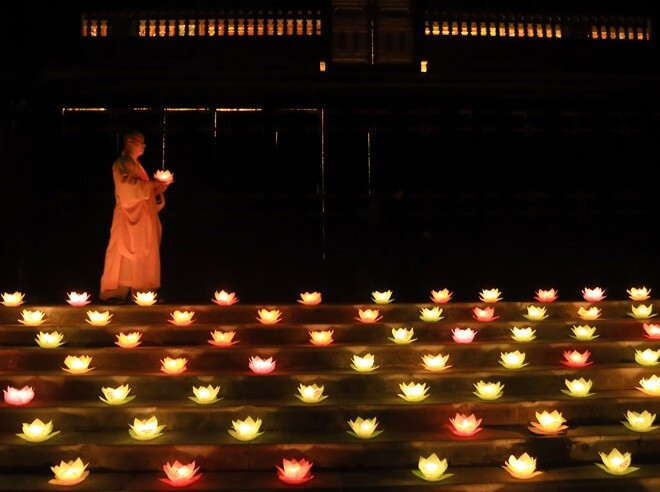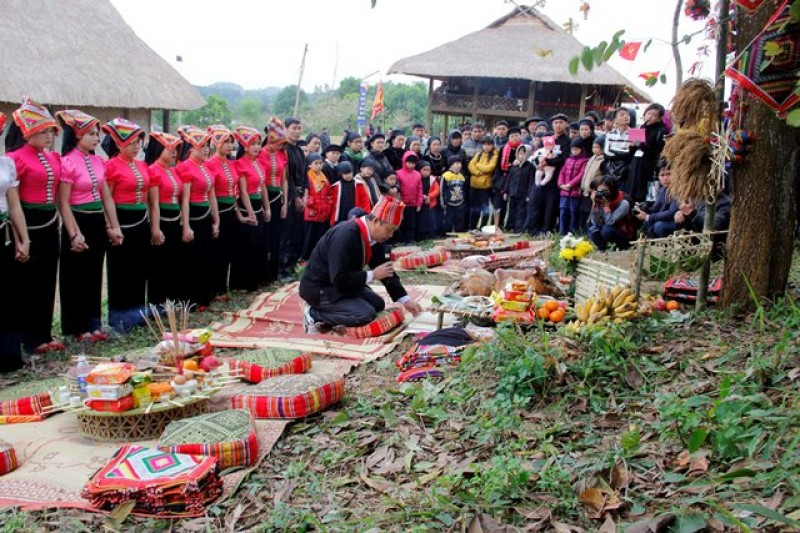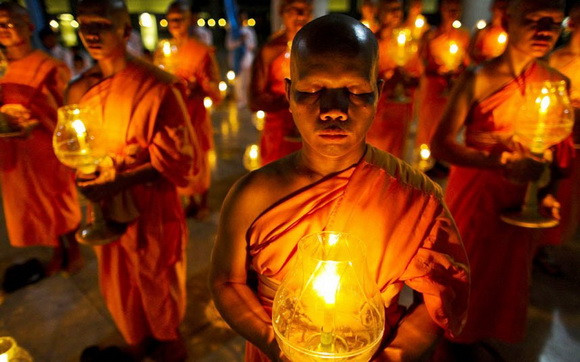The meaning of prayer in Buddhism
(Baonghean.vn) - Prayer is the expression of people's dreams and hopes for real or ideal life. Prayer is still an expression of goodwill, meaning that when a person clasps his hands and bows his head before the Buddha altar, his heart becomes humble, his "I" becomes small, his conscience awakens and his soul is at peace.
In Buddhism, the words "prayer," "ask," or "wish" are understood to be synonymous with the term"pràrthanà" (Sanskrit) or "patthanà" (Pali). Pràrthanà is derived from the root "pra+arth" means wish, desire, hope, beg.
 |
| The memorial service - an important ritual in Vietnamese beliefs. Photo: Internet |
Prayer is a spiritual need of human beings, a legitimate need. First of all, it is to relieve psychological inhibitions caused by pressure from circumstances, emotional disappointments, and frustrations in social relationships.
Secondly, prayer is the expression of people's dreams and hopes for real or ideal life. However, prayer is still an expression of goodwill. That is, when a person clasps his hands and bows his head before the altar of Buddha or Saint, his heart becomes humble, his "I" becomes small, his conscience is awakened and his soul is at peace.
Prayer in Buddhism is also a practice of Buddhists. Thanks to prayer, their will is strong, their faith grows, good karma is promoted, bad karma is eliminated, and their mind tends towards the path of liberation.
In the common sense, prayer is an expression of gratitude and repayment to ancestors, grandparents, parents, relatives... an expression of love, care, and concern for each other such as prayers: praying for the dead, praying for peace, repentance...
Prayers are initially an expression of selfish concerns, but gradually, due to the nature of prayer, they will elevate the spirit of altruism. Prayers, incense offerings, invocations to Buddha, prayers, and dedications in Buddhism all have two aspects, for oneself and for sentient beings. The meaning of prayer is to elevate the spiritual life and strengthen the faith for oneself and others.
 |
| Thai people's peace praying ceremony. Photo: Internet |
4 forms of prayer
1.Pray for the dead: Praying for the dead is praying for the Triple Gem to bless the deceased soul to be gently liberated in the other world and to be born in the Pure Land of Amitabha Buddha.
Praying for the dead is praying for grandparents, parents, and relatives who have passed away to be liberated and have peace in the other world. Thus, praying for the dead is an expression of concern, worry, love, and help for one's loved ones. Caring for the deceased can do nothing other than praying.
2.Pray for peace: Pray for your loved ones or yourself to be safe and overcome disasters and calamities.
Praying for the well-being of others demonstrates the positive qualities of compassion and altruism, thus creating “virtue”. The more our mind tends toward selflessness and altruism, the closer the interaction (sensation) between our mind and the mind of Buddha and Bodhisattva (other power), thus having a strong impact on the person or situation we pray for.
3.Pray for repentance: Praying for the foolish mistakes you have made to not happen again, expressing remorse, hoping for the witness and forgiveness of the divine beings or even of those you have caused suffering to. Sometimes people also pray for repentance on behalf of their loved ones. The need for repentance speaks of conscience, morality and intelligence.
4.Pray for spiritual progress: Praying for one's soul to develop good intentions, to develop wisdom to overcome karma and evil spirits to soon achieve one's goal of liberation. The need to pray for spiritual progress expresses the spirit of determination to progress, expresses the desire to seek the truth of Buddhists.
Characteristics of prayer in Buddhism
 |
| Monks solemnly pray at the flower lantern ceremony. Photo: Internet |
The limit of prayer is not to get what you want, not to ask God to satisfy your evil requests or your hopes. Psychologically, prayer relieves internal inhibitions, a state of high tension, despair is very dangerous, prayer will reduce that pressure.
On the other hand, prayer is the expression of dreams and hopes that create spiritual encouragement and increase vitality for people who are suffering a lot. The main thing of prayer in Buddhism is the transformation of karma. If we create bad karma, then praying is useless. Praying in the direction of transforming evil into good is encouraged and accepted by Buddhism.
In short, prayer is a need to calm anxiety, fear, sadness, and disappointment. Prayer is also a way to express secret dreams, hopes, and beliefs in life. Through the methods and objects of prayer, people can express love, longing, gratitude, and gratitude to grandparents, parents, and relatives. Thus, prayer is a form of culture that brings faith, strengthens morality, and tames human ferocity.
Furthermore, prayer increases one's willpower and strengthens one's faith to guide one's life in the direction of truth and noble ideals. When one has not yet completely mastered one's body and mind, has not yet overcome worries and fears, has not yet attained the level of cultivation and freedom, then prayer has the effect of supporting oneself to progress steadily on the spiritual path. As long as there is honesty, sincerity and the goal of going upward and toward goodness, the response of Buddha's power... will certainly occur.


